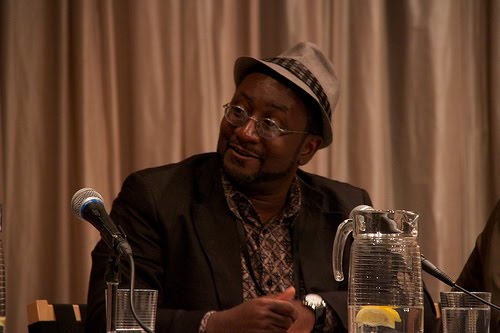"Preston L. Allen, I loved ALL OR NOTHING. I'm glad I met you on Goodreads. I'm honored to have such a great writer to correspond with back and forth like this. Isn't technology wonderful? As you know, I am still working on my science fiction novel and I agreed with you and some others who have read it that the character [ ]'s lisp is not working. One of my readers even suggested that I get rid of it. But I like the lisp. It sets him apart from the other warriors and I think it adds humor. Any suggestions? Sci-fi guy."
Thanks for the email and for reading the novel, Sci-fi guy. Here's something you can do. I'd like you to go and buy a little novel called PUSH by Sapphire which was published a couple years ago. After you have read the first few chapters of that book, I want you to reflect on the severity of the main character's poor grammar and non-standard dialect. It is pretty bad, isn't it? Clarice Precious Jones is a child of the ghetto and she speaks like one.
Now I want you to reflect on how relatively easy it was for you to UNDERSTAND everything that Clarice was saying, despite her use of non-standard English. Does this surprise you?
Finally, I want you to go back and re-read Clarice's words, paying attention to how much non-standard stuff is actually there on the page.
Are you surprised that the actual stuff on the page is not as poorly written as you originally thought? It sounds worse in your head than it actually is on the page.
Remember this rule: More is less and less is more.
What writers do when they are creating dialogue for characters who speak with an accent, or who speak a non-standard English, or who are afflicted with speech impediments is that they SPRINKLE THE SOUND OF THE LANGUAGE in the reader's head: in other words, they give you a sampling of the way the speaker sounds and then your brain continues to hear it each time the character speaks.
For example, they may have a character say, "Zees is not so good. I zink that I will have to leave before your theater group arrives. Your director does not like me too mucho, I zink."
Your brain hears a heavy accent, but when you see the actual sentences, only the words this (zees), think (zink), and much (mucho) are non-standard. If you sprinkle the sound of the accent in strategic places, the reader's brain will hear the accent everywhere (less is more).
On the other hand, look at this passage: "Zees ees no so gut. I zink zet I weel hef to leef before jour zeater groupo will to arrives. Jour deerictor doos no to liki me too mucho, I zink."
This passage has more of the accent, but it is rather difficult to read--imagine trying to read an entire page of it. Instead of allowing the brain to HEAR the accent of the speaker, a passage with too much dialect sprinkled in creates a problem in comprehension (more is less). Furthermore, It may create humor where none is intended, or it may offend the speakers of that dialect (or speakers with that speech impediment) where no offense is intended.
So in the case of your character [ ]'s lisp, I think what we readers found when we reviewed it is that there was too much of a lisp. It became annoying after a while and didn't really add anything to the character, except a cheap laugh. Sprinkle in a little bit of the lisp, however, and the scene will read a lot better.
I hope this helps, Sci-fi guy. Keep on writing!
By the way, you didn't give me your interpretation of my dreams.
Thanks,
Preston

1 comment:
When I started writing this comment, I was 72.44% sure I took a creative writing class with you, Prof. Allen.
After reading the latest entry in this here blog, I'm now 98.52% sure I took a creative writing class with you, Prof. Allen, if indeed you used to/still teach at MDC.
Oh right, the comment. Thank you for the advice on how to write a lisp. I shall put it to good use whilst I finish a homework assignment for narrative technique with Prof. Dufresne.
Ta,
Ingrid, former student and future President for Life of Tuvalu.
PS: Thank you for weaning me off adverbs, if you are indeed, Prof. Allen. Okay. I'm going now.
Post a Comment